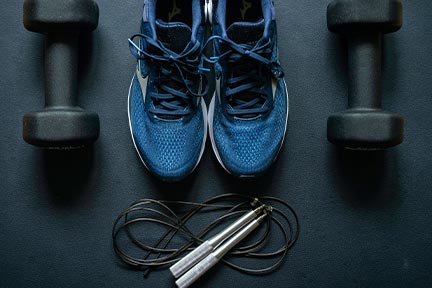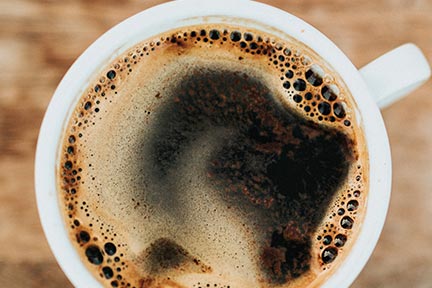Truckers With Sleep Apnea: 5 Tips for Truck Drivers Managing Sleep Issues

From continuously searching for places to rest and consuming too much caffeine to stay awake, life on the road tends to be restless for truck drivers. In fact, sleep deprivation is one of the most common causes of semi-truck accidents. What’s more, according to the Federal Motor Carrier Safety Administration (FMCSA), one-third of truck drivers in the United States have developed sleep apnea due to their lifestyle.
Whether you're curious about how the truck driving experience may impact your health or common sleep issues for truckers, AcousticSheep™, the creator of the world’s most comfortable headphones for sleep, has got you covered.
1. Follow a Healthier Diet

For truck drivers, food choices are limited. Often on a time crunch, truck drivers can only afford to stop to get meals that are quick and easy to consume while being easily accessible. An Australia-based study conducted by the National Center for Biotechnology Information (NCBI) cites that "half [of the Australian truck drivers surveyed] consume fewer servings of fruit per day and most (88.1%) consume fewer servings of vegetables per day than Australian recommendations."
A U.S. study has found that "obesity is more than twice as prevalent among truck drivers compared to the general population (69% vs. 31%)," and the Center for Disease Control's (CDC) findings coincide with those results. Along with the increase in obesity, truck drivers with sleep apnea have an increased risk of heart disease, diabetes, and hypertension due to poor diet. However, there are ways to combat the ease of purchasing unhealthy foods, such as packing or preparing:
- Apples
- Bananas
- Beef jerky
- Buns and rolls
- Chicken and turkey lunchmeat
- Egg, tuna, and chicken salad sandwiches
- Instant rice
- Popcorn
- Pre-peeled hard-boiled eggs
- Trail mix
According to the NCBI, "low fiber and high saturated fat and sugar intake is associated with lighter, less restorative sleep with more arousals." So, when it comes to trying to find ways to improve sleep issues for long-haul truck drivers, watch what you eat during the day! However, while it's true that foods high in fat may have a negative impact on your health in large quantities, you can still enjoy these foods in moderation.
2. Increase Your Physical Activity

According to a survey of truck drivers conducted by the CDC, "three out of four truck drivers said they did not get the recommended amount of physical activity." For adults (those 18 and older), the recommended amount of physical activity is 150 minutes per week, which is about the equivalent of 30 minutes per day five days a week. While 30 minutes a day may not seem like much, it can be difficult for truck drivers to find time in the day (or night) to exercise.
If you are a truck driver that has found the time for physical activity, here are some small pieces of exercise equipment that you can store in your truck:
- Dumbbells
- Kettlebells
- Ankle weights
- Exercise bands
- Wrist weights
- Medicine balls
- Jump rope
However, you do not have to lift weights to maintain your weight. Walking at a brisk pace or jogging for thirty minutes are perfect for improving your physical health, and you can stay focused with the help of RunPhones® headphones. Additionally, sightseeing and going outside have been proven to improve mental health. Furthermore, Hopkins Medicine states that exercise decreases the likelihood of the onset of insomnia and restlessness so chances are exercise will help to manage sleep issues for truckers.
3. Drink Less Caffeine

Many truck drivers consume caffeine to stay awake on the road. However, caffeine consumption is not limited to coffee. It is also included in dark chocolate, pure caffeine powder, energy drinks, supplements, tea, soda, and energy shots.
American Trucker Magazine reported that vehicle collisions are 6% more frequent among truck drivers who consume large amounts of caffeine. While caffeine may not be the sole perpetrator behind crashes, it certainly lends a hand to them.
While caffeine plays an effective part in keeping people awake for a brief period of time, it can also disrupt your body's circadian rhythm (sleep-wake cycle) in the long term. Other effects of caffeine intake include:
- Diarrhea
- Sweating
- Nausea
- Increased heart rate
- Increased breathing rate
- Muscle tremors
Consuming copious amounts of caffeine can be detrimental to your health in the long run as your body begins to rely on it to function. When you stop taking caffeine, you may experience withdrawal symptoms, such as headaches, excessive sleepiness, low energy levels, and poor moods, all of which complicate your body's natural sleep cycle. For a natural energy boost, make sure you are getting enough sleep, limiting caffeine intake, and consuming the right amount of nutrients that your body requires. Too much caffeine can lead to the development of insomnia.
4. Prioritize Your Sleep Schedule

Another study by the NCBI has claimed that "unspecified sleep disorders were reported by 20% to 28.6% of truck drivers, insomnia by 27.5%, and OSA (obstructive sleep apnea) by 25.8–51%." The same study then went on to state that truckers often get less than the recommended amount of sleep per night (7-9 hours). Sleep deprivation can be caused by a number of factors, such as:
- Caffeine intake
- Pressure to meet delivery deadlines
- Temperature
- Environment
- Breathing difficulties
- Restlessness
5. Try Quality Headphones to Manage Sleep
Laura, a long-haul trucker who also drives team (a truck that never stops moving), recently left a review stating that she's either driving the commercial truck or attempting to rest. However, various sounds and bright lights often prove to be obstacles getting in the way of a decent night's sleep. While she gave a pair of cellphone headphones a try, Laura went on to say that "they were uncomfortable and I had to mind the cord."
As an alternative, Laura tried a pair of AcousticSheep's Bluetooth® SleepPhones® headphones to see if they could compete. Laura went on to say that SleepPhones® headphones:
Are great quality, and the headband fits nicely around my head and covers my eyes without feeling like I'm blindfolded. Even if my partner is sleeping next to me, he doesn't hear my music. The battery lasts all night, and is easy to recharge. I've used my SleepPhones while on a trip out of town as well as in the truck. They helped me relax and sleep well in a hotel, an AirBnB, and a friend's house. These may be more expensive than others on the market, but I'm happy I bought these instead of some knock-off that wouldn't have lived up to this quality. Highly recommended.
At AcousticSheep, our team of professionals strives to help you obtain a better night's sleep. If you're a driver searching for a product that will reduce outside noise while preserving battery life and blocking out light, try a pair of our SleepPhones® headphones.
We also provide a CD catalog of sleep-inducing sounds that are bound to fit your specific needs; you can even rate what sleep sounds work the best for you by downloading our app, Sleep Sounds by AcousticSheep™. While we certainly do not recommend using a pair of our headphones while driving, SleepPhones® are perfect for those restless nights in the truck.
All product and other information obtained through or presented on the Site is for informational purposes only. You should consult with a qualified healthcare professional for specific information about any personal care, healthcare or medical needs. The products provided through and the information provided on the Site are not intended to substitute in any manner for medical treatment, medical advice, or medical diagnosis by a doctor or other healthcare professional. You should not forego, change or stop any tests or treatments that have been prescribed or recommended by any of your healthcare provider(s) without first consulting with your healthcare provider(s). You should not rely on any product you receive through or any information you receive from the Site when making any personal care, healthcare or medical decision, including but not limited to any decisions about treatment, testing, diagnosis or follow up. IF YOU ARE, OR SUSPECT THAT YOU ARE EXPERIENCING A HEALTH EMERGENCY, PLEASE CALL 911.
